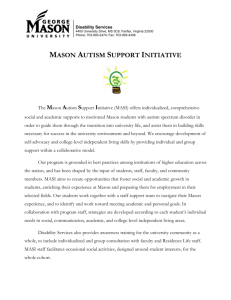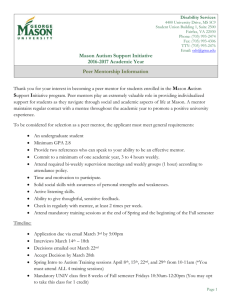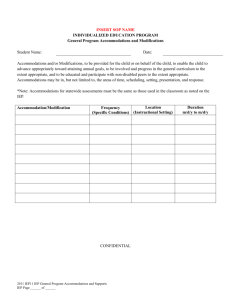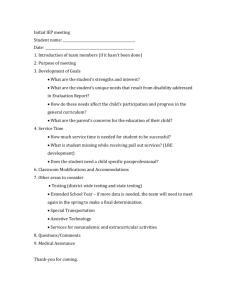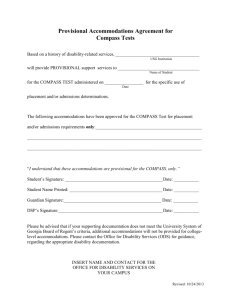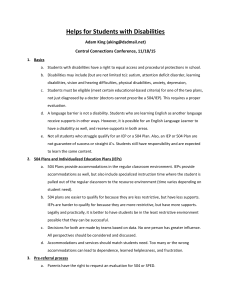Applicants must provide documentation, which will be evaluated on
advertisement
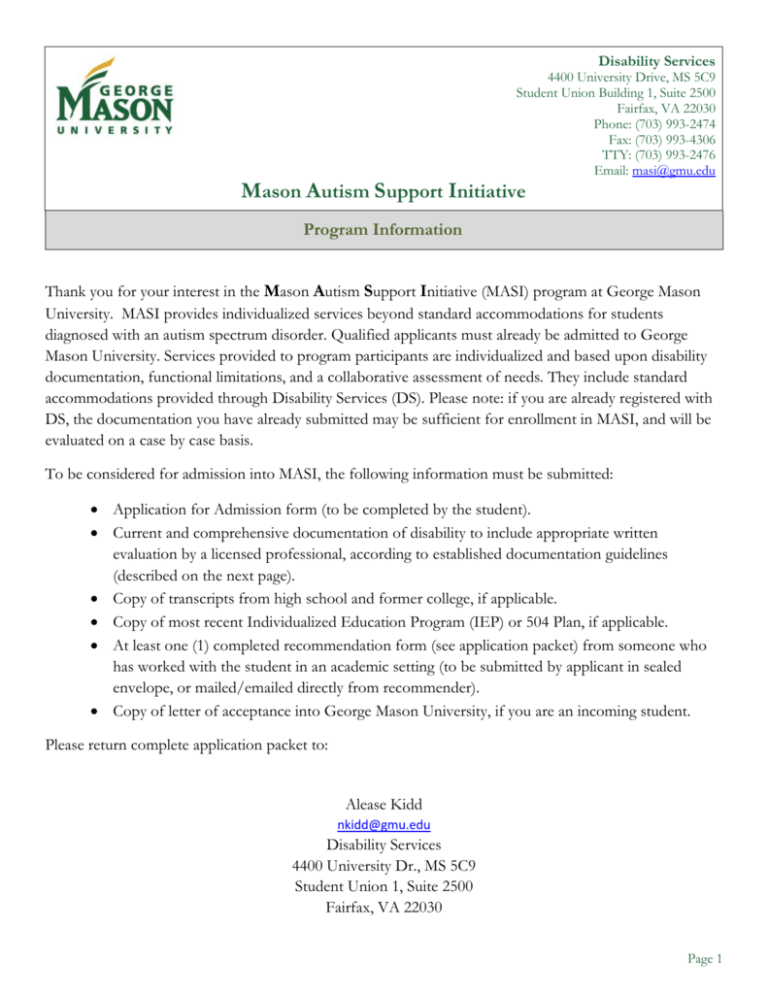
Disability Services 4400 University Drive, MS 5C9 Student Union Building 1, Suite 2500 Fairfax, VA 22030 Phone: (703) 993-2474 Fax: (703) 993-4306 TTY: (703) 993-2476 Email: masi@gmu.edu Mason Autism Support Initiative Program Information Thank you for your interest in the Mason Autism Support Initiative (MASI) program at George Mason University. MASI provides individualized services beyond standard accommodations for students diagnosed with an autism spectrum disorder. Qualified applicants must already be admitted to George Mason University. Services provided to program participants are individualized and based upon disability documentation, functional limitations, and a collaborative assessment of needs. They include standard accommodations provided through Disability Services (DS). Please note: if you are already registered with DS, the documentation you have already submitted may be sufficient for enrollment in MASI, and will be evaluated on a case by case basis. To be considered for admission into MASI, the following information must be submitted: Application for Admission form (to be completed by the student). Current and comprehensive documentation of disability to include appropriate written evaluation by a licensed professional, according to established documentation guidelines (described on the next page). Copy of transcripts from high school and former college, if applicable. Copy of most recent Individualized Education Program (IEP) or 504 Plan, if applicable. At least one (1) completed recommendation form (see application packet) from someone who has worked with the student in an academic setting (to be submitted by applicant in sealed envelope, or mailed/emailed directly from recommender). Copy of letter of acceptance into George Mason University, if you are an incoming student. Please return complete application packet to: Alease Kidd nkidd@gmu.edu Disability Services 4400 University Dr., MS 5C9 Student Union 1, Suite 2500 Fairfax, VA 22030 Page 1 MASI Documentation Guidelines Applicants must provide documentation, which will be evaluated on a case-by-case basis, according to guidelines of DS. These guidelines are based upon the description of quality documentation of a disability by the Association of Higher Education and Disabilities (AHEAD) and the College Board. Documentation must include a comprehensive assessment administered within the last three to five years by a person with appropriate professional credentials (e.g. a psycho-educational, neuropsychological, or psychological evaluation by a licensed psychologist or psychiatrist) who has undergone relevant training and has no personal relationship with the individual being evaluated. The ideal assessment would include: Discussion of the individual’s functional limitations, and current functioning as it impacts ability to participate in the university’s educational programs and services. A clear diagnostic statement that identifies and follows DSM-IV-TR or DSM-V criteria. An interview including a description of the presenting problem(s) including any significant developmental, medical, psychosocial, and employment issues; family history; current level of adaptive/daily living skills; discussion of comorbidity where indicated; and relevant information regarding the individual’s academic history. (A comprehensive summary/interview with both parents, if possible, and a self-report is needed to get a view of the student’s present functioning and ability.) Discussion of behavioral, social, and communication issues. Standardized measures of cognitive development, academic achievement, information processing, and current social/emotional functioning (if not in neuropsychological or psychological evaluation, this can be administered by a separate evaluator). A description of the diagnostic methodology used that includes description of the diagnostic criteria, evaluation methods, procedures, tests and dates of administration, as well as a clinical narrative, observation, and specific results. An integrated narrative summary, to include current symptomatology, treatment, and ongoing needs. Summary must include impact of symptoms on learning, ability to function, and deficits as related to postsecondary education. Information on expected changes in the functional impact of the condition over time and context. A description of current and past accommodations, services, and/or medications (to include any possible side effects that may influence the learning environment). Recommendations for accommodations, assistive services, assistive technology, compensatory strategies, and/or collateral support services. It is helpful when recommendations are logically related to functional limitations, or if connections are not obvious, a clear explanation of their relationship can be useful in decision-making. Additional guidelines: Accommodation needs change and are not always identified at the time of initial diagnosis. A prior history of accommodation, without documentation of current need and consistent use, does not demonstrate eligibility for accommodations. While doctor’s notes and school plans such as an IEP or 504 Accommodation Plan may be helpful in determining a student’s needs, they alone are not sufficient to substantiate a request for program services and accommodations. Conclusive statements without supporting information are unhelpful. Additional information, such as survey forms and direct teacher observation, can be included. Page 2 Disability Services 4400 University Drive, MS 5C9 Student Union Building 1, Suite 2500 Fairfax, VA 22030 Phone: (703) 993-2474 Fax: (703) 993-4306 TTY: (703) 993-2476 Email: masi@gmu.edu Mason Autism Support Initiative Application for Admission Please complete the following information and submit this form as part of your application packet. This application for admission form will be used to assist the MASI team by providing valuable information to assist in understanding your strengths, needs, concerns, and goals. Please complete all questions accurately and to the best of your ability. Incomplete applications will not be reviewed. The information requested will be held in complete confidentiality, with only authorized program staff able to access it. Personal Information Name: G#: Nickname (if applicable): Address: Date of Birth: Street Age: Male Female City Phone Numbers E-mail Addresses Cell Phone: GMU: Alternate Phone: Alternate E-mail: State Zip Code @masonlive.gmu.edu Parent/Guardian Name: Name: Phone: Phone: Email: Email: How Did You Learn About Our Services? Page 3 Educational Information Are you a transfer student? Yes School:_________________________ No Date of Enrollment at GMU ________________ Major __________________________________ Anticipated Graduation Date ________________ Please list the high school and colleges (if applicable) you have attended, beginning with the most recent at the top. List diplomas or certificates you received. Name & location of school Dates attended Diploma or certificate Support Services Did you have an IEP in high school? Yes No Please indicate below any support services you currently receive, or have received within the past 3 years: Tutoring Special Services for ASD/learning disabilities Occupational Therapy Individual Therapy Speech & Language Therapy Group Therapy Wraparound service Special Education Teacher Other: ________________________________________________________________________________________________ ________________________________________________________________________________________________ ________________________________________________________________________________________________ Did you receive accommodations through a 504 Plan in high school? Yes No If yes, please list your accommodations below: Page 4 What support services or accommodations have you found to be most helpful to you in your educational career? ________________________________________________________________________________________________ ________________________________________________________________________________________________ ________________________________________________________________________________________________ ________________________________________________________________________________________________ ________________________________________________________________________________________________ Please provide us with a copy of your most recent 504 Plan or IEP if applicable. Diagnostic Information Please check off the diagnosis you have received that make you eligible for MSSI services: Asperger’s Disorder Autistic Disorder Pervasive Developmental Disorder, Not Otherwise Specified (PDD-NOS) Social (Pragmatic) Communication Disorder Please list any additional diagnoses that have been formally assessed: Brief Personal Statements (please use additional paper if necessary) What are your expectations of MASI? What do you hope to get out of the program? Based on previous experiences, what are your academic strengths? Based on previous experiences, what are your academic challenges? Page 5 How would you describe your learning style (how do you learn best)? What have you accomplished that has made you proud? How do you enjoy spending free time? Do you have any particular academic or career interests? If so, what are they? Are you involved with any teams, clubs, or organizations? If so, which ones? What are some of your long-term goals (where do you see yourself in 5 or 10 years)? If you were to describe your diagnosis and how it affects you, what would you say? Page 6 Please provide additional information that you feel would be important for us to know about you. By signing below, I am agreeing to allow the Disabilities Services staff at George Mason University to use this information as part of their application process for admittance into the MASI program. By signing below, I am certifying that the information on this application is accurately presented. Signature Date Page 7
